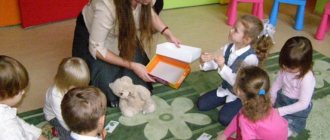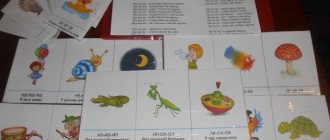Problems of speech development of children in the modern world.
Author: Ruzanova Svetlana Mikhailovna MBDOU TsRR D/S No. 36 Almetyevsk RT
Problems of speech development of preschool children in the modern world.
Recently, there has been an active reform of the preschool education system. A lot of new programs are being published aimed at raising and educating children. But at the same time, very little time is devoted to speech education. In many institutions, speech therapy groups have begun to close, but, nevertheless, according to statistics, the number of speech disorders has tended to increase in recent years. The most numerous category among all preschoolers with developmental disabilities are children with speech defects (from 45 to 60%). Nurturing correct and clear speech in a child is one of the important tasks in the overall system of work of a preschool educational institution. Speech development, including the ability to clearly pronounce sounds and distinguish them, correctly construct a sentence, etc., is one of the pressing problems facing the modern world. After all, correct speech is one of the indicators of a child’s readiness for school, the key to successful development of literacy and reading: written speech is formed on the basis of oral speech, and children suffering from its underdevelopment are potential dysgraphics and dyslexics (children with writing and reading disorders). If violations of sound pronunciation, vocabulary, grammar, phonemic processes are not eliminated in time, preschool children will have difficulties communicating with others, and in the future certain personality changes will occur along the development path “child - teenager - adult”, when a person’s complexness will interfere with his ability to study, and fully reveal your natural abilities and intellectual capabilities. Much attention was paid to the system of training and education of preschool children with speech disorders by: G.A. Kashe, T.B. Filicheva, G.V. Chirkina, V.V. Konovalenko, S.V. Konovalenko and many others.
Speech is a social phenomenon and serves as a means of communication between people. Timely and correct speech development is a necessary condition for personality formation. Thanks to speech, a child learns about the world, accumulates knowledge, and masters norms of behavior. Pure, correct speech is one of the most important conditions for normal human mental development. With the help of speech and communication, a child easily and imperceptibly enters the world around him, learns a lot of new and interesting things, and can express his feelings in words [25, - p13]. E.I. Tikheeva believed that speech is the basis of mental development and the treasury of all knowledge. Concern for the content of speech should go hand in hand, with concern for the construction of speech [41, -p. 7].
An adult must create special conditions for the development of understanding of speech, activation of the speech apparatus, teach the child to use words, evoke the need to speak, and speak correctly and clearly; In addition, the speech of an adult is an object to be imitated, and therefore he must watch how he speaks. [13, с5]
An analysis of the current situation in the system of education and training of preschool children has shown that the number of children with speech development disorders is steadily growing. These children constitute the main risk group for school failure, especially when mastering writing and reading. The main reason is the insufficient development of the processes of sound-letter analysis and synthesis. The process of mastering the sound composition of a word is closely related to the formation of auditory-speech-motor interaction, which is expressed in the correct articulation of sounds and their subtle differentiation by ear [48, p. 9].
The prerequisites for successful learning to write and read are formed in preschool age. It has been established that the age of the fifth year of life is optimal for the education of a special, higher form of phonemic hearing - phonemic perception and orienting activity of the child in speech activity. Underdevelopment of the phonetic side in children is the most difficult in overcoming speech disorders, including defective sound pronunciation; it does not decrease from year to year, but only increases [49, p. 7].
It has been established that in order to master the sound side of the language, it is necessary not only for children to have intact hearing and a sufficiently prepared articulatory apparatus, but also the ability to listen well, hear and distinguish between the correct and incorrect pronunciation of sounds in someone else’s and their own speech, as well as control their own pronunciation. In the process of perceiving someone else's speech, the child must comprehend the content of what is being said to him. By pronouncing words himself, the child not only speaks, but also listens. Children with well-developed speech during communication do not pay attention to what sounds they pronounce and in what sequence [17, p12].
Any speech deficiencies limit a child’s communication with peers and adults and negatively affect the formation of his emotional and intellectual sphere, and can also lead schoolchildren to failure in many disciplines [4, p3].
Education of “pure” speech in children with speech disorders is a task of social significance, and everyone should be aware of its seriousness: speech therapists, parents, educators [40, p151].
Speech impairment remains one of the most common forms of pathology in preschool children. Only correct speech allows a child to study successfully at school. Organizing specialized care for children with speech disorders is one of the important tasks of modern speech therapy, since the number of children with this type of defect is steadily growing every year. The task of a speech therapist is to teach the child to speak correctly and clearly, to help master speech, and to use it correctly. A child’s full speech is an indispensable condition for his successful learning at school. Therefore, it is very important to eliminate all shortcomings in sound pronunciation even in preschool age, before they turn into a persistent complex defect. In addition, it is important to remember that it is during the preschool period that the child’s speech develops most intensively, and most importantly, it is the most flexible and pliable. After all, the ability to use speech is a serious science and no small art.
Bibliography
1. Bogomolova A.I. Pronunciation problems in children. - M. Education, 1979.- 208 p.
2. Gerasimova A.S. Popular speech therapy. Classes with preschoolers. - M. Iris-press, 2009. - 224 p.
3. Efimenkova L.N. Formation of speech in preschool children. - M. Education, 1985. - 110 p.
4. Maksakov A.I. Development of correct speech of a child in the family. - M. Mosaika-Sintez, 2006. - 112 p.
5. Maksakov A.I. Is your child speaking correctly? - M. Education 1988. - 159 p.
6. Stepanova O.A. Preschool speech therapy service. - M. Creative Center Sfera, 2008. - 124 p.
7. Tikheyeva E.I. Children's speech development. - M. Education, 1972. - 173 p.
8. Filicheva T.B., Chirkina G.V., Tumanova T.V. Program “Correction of speech disorders”. - M. Education, 2010. - 272 p.
9. Filicheva T.B., Tumanova T.V.
Children with phonetic-phonemic underdevelopment. - M. Gnome-Press, 1999. - 78 p. comments powered by HyperComments
What is ONR
General speech underdevelopment
is a form of speech pathology when a child has not developed all components of the speech system: phonetics, vocabulary, grammar, coherent speech. At the same time, his hearing and intelligence are preserved.
OHP can manifest itself both in the form of a complete absence of speech, when the baby makes only some sounds, and in the form of coherent speech, but with residual violations of phonetics, vocabulary and grammar.
General underdevelopment of speech is observed in various forms of speech defects, for example:
- with dysarthria syndrome
– speech pathology is associated with impaired innervation (mobility) of the speech apparatus; - rhinolalia
- “cleft palate”, “cleft lip”, adenoids, etc.; - alalia
- gross speech impairment or lack thereof due to organic damage to the speech areas of the cerebral cortex; - aphasia
- the collapse of already formed speech due to local organic damage to the speech areas of the brain (for example, after a head injury).
Unfortunately, many parents underestimate speech problems. Excuses can be different: “it will go away somehow,” “it’s just developmental features,” “our dad started talking at the age of 3 and nothing.” And when a child at school fails to cope with the program, adults grab their heads, scold the student for bad grades and think that their child is an illiterate lazy person. But it’s not about the child: with OPD, children “receive as a gift” writing and reading disorders (dysgraphia, dyslexia).
Correction of general speech underdevelopment
Children with ODD enter the correctional group of a preschool institution from the age of 5, where a speech therapist, together with teachers, works to overcome the disorder. The senior and preparatory groups work according to a special program T.B. Filicheva and G.V. Chirkina.
Don’t think that a correctional group is a death sentence. On the contrary, with this form of education, teachers have the opportunity to pay close attention to the problem of a child with ODD. And it will be easier for the child to cope with the violation, because the teachers of the correctional group have the appropriate education and work experience.
If a child has a level 1-2 OSD, then after kindergarten he enters a school for children with severe speech disorders. Children with level 3 ODD go to correctional classes in a public school; with OHP level 4 – study in regular classes.
It takes time to overcome general speech underdevelopment. Parents must understand that this is not a matter of one month and they need to make every effort: to develop the child’s speech, to encourage him to take a speech initiative. This, of course, is a lot of work with a speech therapist, psychologist, and also a neurologist.
What should parents be wary of?
Signs of OHP:
- Speech appears late (at 3-4 years, sometimes at 5 years);
- the baby speaks as if he has “porridge in his mouth”;
- makes many mistakes in speech: misses prepositions, finds it difficult to identify cause-and-effect relationships, rearranges syllables in words, cannot agree on parts of speech, etc.;
- It is difficult for a child to remember and retell the text;
- memory and attention suffer;
- the vocabulary is very limited, it is difficult for the child to express his thoughts;
- gross and fine motor skills are poorly developed.
In this case, parents should not listen to others who assure that the child will “soon speak,” but go for examination to a specialist.
There are 4 levels of speech development, taking into account the degree of OHP:
Level 1 – “speechless”.
The child’s vocabulary is very poor; the baby uses babbling words, impersonation, and gestures to communicate. In this case, the main task of the speech therapist is to develop the child’s understanding of the speech addressed to him and to achieve speech motivation from him.
Level 2 – the child uses simple phrases of 2-3 words
, while gross errors in speech are observed, vocabulary lags behind the age norm. The baby cannot combine objects according to a common characteristic (spoon, fork, plate - dishes; apple, pear, plum - fruits). The pronunciation of many sounds is impaired, speech is unintelligible.
Level 3 – an expanded phrase appears.
Despite the fact that at this level the child’s speech becomes more lively, he still uses simple sentences. Sound pronunciation is impaired. The vocabulary is increasing, but the baby still finds it difficult to understand common phrases and complex turns of phrase. He uses prepositions incorrectly, may omit them, and there are errors in coordinating parts of speech (“I saw a dog and went home” instead of “I saw a dog and went to home”).
Level 4 – in general, the child’s grammatical structure is approaching the norm
, but it is difficult for him to pronounce words with complex syllabic composition (“blalazhan” instead of “eggplant”), he makes mistakes when inflecting words (“five chickens” instead of “five chickens”). During a retelling, it is difficult for a child to follow the plot line, and when memorizing poems, he often confuses the words. Residual gaps in speech development are noticeable.
Reasons for OHP
There are many reasons for this pathology. One of the most common is intrauterine hypoxia. It can also be birth and traumatic brain injuries, difficult pregnancy, intoxication, asphyxia (oxygen starvation) and more.
An unfavorable environment also affects the development of a child’s speech. Often such cases are observed in dysfunctional families, when parents, for example, abuse alcohol and do not pay attention to their children, sometimes even not letting them out into the street. You can find “Mowgli syndrome” in guys. Children have not developed communication skills, because simply no one talks or engages with them.
The most relevant and useful information for modern parents is in our newsletter. We already have over 30,000 subscribers!











